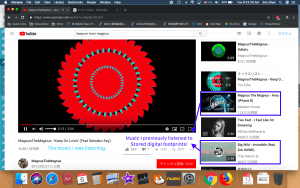Digital footprints, just like Neil Armstrong’s footprint on the Moon, will never be washed away or worn out once you left them, even though you tried to delete them. They are the most important aspect to your future life as your digital citizenship becomes more apparent as you enter the digital world, full of technologies around.
Digital footprints shape your digital citizenship by watching and recording your browsing interests, what you browsed throughout each day, or what you post on social media, for sure. Even though you have deleted your browsing history or a post on Facebook or even your “Cookies,” your footprints will still be there, lasting forever on its servers.
According to an article by Radio New Zealand, digital footprints are very easy to find: with just single name investigators are able to find the person’s full name, age, parents, address, where he/she grew up, partner’s name and occupation, information about their children, and his/her shopping routines. With more time given, more information could be dug out from social media. Platforms like Facebook where you voluntarily give your personal information to it may easily be leaked and people other you know, especially hackers and bad guys, could easily keep track of all your daily routines or even kidnap you while you’re inside your house since they already knew your home address. That’s why you don’t want to share your personal and private information with social media or other people you don’t know.
How digital footprints harm your digital citizenship is that they last forever, even though you tried to delete them on your device. After you posted something bad on social media, it will be stored eternally, like what you said to someone else cannot be taken back. Deleting the post from social media just doesn’t work as your footprints are stored on the company’s servers. Let’s set an example here. A boy who was a straight-A student in all classes previously but posted something showing racism against all others on Facebook applied for a top university. At first, the interviewer saw his transcript being perfect and all the recommendations that his teachers at high school wrote said that he was a top student throughout his years at high school and they believed that he will perform well in college. The interviewer wanted to accept his application, however, he accidentally viewed the student’s personal Facebook page. It was full of posts related to racism: He hated all other people around the globe except the WHITES!!! “He should be an extreme racist, and I need to circumspect whether to accept his application or not,” the interviewer considered. The student said that he already deleted the post from Facebook, but somehow it magically reappeared as the interviewer went through his Facebook account. The post was never deleted from Facebook’s servers and that had become a digital footprint and shaped his digital citizenship. That footprint eventually led his application not being accepted by that college.
I have my own example here. Check out this image.
I was listening to Keep on Lovin by MagnusTheMagnus, however, at the right, there are suggested videos, 2 of them are music that I previously listened to. Oh my god! Digital footprints were also stored even though I was browsing in Incognito mode!!! My browsing history in Incognito was automatically deleted once I close that window, but it seemed that digital footprints are still stored no matter you turned on tracking protection or not because of COOKIES.
So always remember… Don’t post something that will affect your digital citizenship on any media in any way. If he didn’t post these messages on Facebook, he would have accepted into that college and became a top student there. Footprints would never be washed away (deleted) after you left it, you know, just like Neil Armstrong’s footprint been never worn out on the Moon even though he left it some several ten years ago. Or… just don’t do anything that will be recorded as your digital footprints, for example, watching videos or playing games in incognito mode. Even though browsing history in Incognito was erased, digital footprints and cookies are stored on your computer, so that what you saw or did before will still show up once you open up Youtube or some other websites.
Q&A: Computers also eat cookies? In what way? 

Computers aren’t living organisms, and so they can’t eat real cookies. However, cookies here are virtual objects. According to a how-to article by Symantec, cookies are small packets of data your computer receives while you’re browsing the Internet, then sends them back without altering it. That means that whenever you’re watching Youtube videos, making a blog post, or even playing games on the Internet, your computer receives cookies from that website and stores them inside your computer. Cookies enabled websites to track your visits and activities, or essentially your digital footprints. In some ways, cookies are essential in some websites, especially in online shopping websites. Without cookies, the website couldn’t even keep track of your stuff stored in your shopping cart, and it would reset whenever you browse another object there. However, cookies store your digital footprints, that means that it could be a security concern over them. It made hackers easier to track your online activity (digital footprints) to see what you are going and what you’re doing online. That’s why Youtube showed my previously watched videos even though I was browsing in Incognito mode because of those little pesky cookies.
Here’s a video about Cookies:


